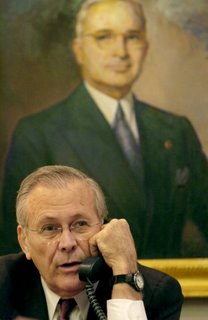

Secretary of Defense Donald Rumsfeld reminds me a lot of President Harry Truman. They both spoke the truth. They both spoke directly. And they often spoke with humor. That wasn't always popular in the 1940's and early 1950's, and it hasn't been popular in the first decade of the 21st century.
Some humor from Rumsfeld's speech at the Truman Presidential Library in Independence, Missouri, March 2, 2006:
After some prodding I'm told that Mrs. Truman agreed to hold a press conference of her own for the first time. Then she canceled it. She did, however, apparently eventually agree to answer reporters' questions. She had the following ground rules. The questions had to be written and submitted in advance. Her responses would be in writing. She reserved the right to respond with short, one-syllable answers, and frequently, no comment. She was onto something. [Laughter]. She had it figured out pretty well, I like that.
. . .
I don't think it would surprise anyone to hear that Mr. Truman was a proud and enthusiastic partisan. He used to say, "Whenever a fellow tells me he's bipartisan, I know he's going to vote against me." [Laughter].
. . .
After the President's typically frank reply and undiplomatic response, Molotov apparently said to President Truman, "I've never been talked to like that in my life." Truman replied, "Carry out your agreements and you won't be talked to like that again." [Laughter]. Sounds reasonable to me.
Though in the context of a smaller war front, like President Truman with the decision to drop the atomic bomb, Rumsfeld has been villified by those who do not understand the stakes in the probable loss of human life, and American life, if hard decisions are not made.


Secretary Rumsfeld's changes to the US military are impressive.
Here's part of Mario Loyola's assessment:
The transformation of a nation's military is the rarest of historical accomplishments — vested interests almost always win, leading the nation into the great danger of increasing vulnerability. As Rumsfeld likes to say, "weakness is provocative," and as the Russians learned in World War I and the French in World War II, an untransformed military can look good on paper and prove worthless on the field of battle. In this case, the vested interests are angry at Rumsfeld because they have lost so many battles in their effort to cling to a military capable of defeating a Soviet Union that no longer exists. Rumsfeld understands what his critics don't—as Charles de Gaulle said, no institution lasts unless it is constantly renewed.
. . .
What Rumsfeld has created is a fully modular, rotational "total force" that achieves division-size effects with brigade-size formations, is vastly more lethal, agile, and integrated than what we had before, and has spread its capabilities across a spectrum of possible challenges. That's how Rumsfeld has helped the country prepare for a future of unknown unknowns. We saw the results in the rapidity with which the U.S. military responded to the Indian Ocean tsunami, orchestrating almost over night one of the largest humanitarian relief operations in history. This saved countless tens of thousands from thirst, disease, and starvation in the critical early weeks after the disaster. It was totally unexpected — but we were ready.
Victor Davis Hanson had this to say about Rumsfeld's strategy in Iraq:
So we are down to his supposed responsibility for the later effort to stop the 3-year plus insurgency, whose denouement is not yet known. Rumsfeld's supposed error that drew such ire was troop levels, i.e., that he did not wish to repeat a huge presence in the manner of Vietnam, but sought to skip the 1964-1971 era morass, and go directly to the 1972-5 Vietnamization strategy of training troops, providing aid, and using air power.
I think he was right, and that most troops in Iraq today would agree. I was just talking to a Marine Lt. back from Haditha and Hit; his chief worry was not too few Americans, but rather Iraqi Security Forces insidiously expecting Americans to do their own security patrolling. Since sending in tens of thousands to do a Grozny-like smash-up is both politically impossible and antithetical to American policy, I don't see the advantage of more troops at all, especially when we will soon near 400,000 Iraqis in arms, which, together with coalition forces of ca. 150,000, would in theory provide 555,000—or more than the "peacetime" army of Saddam's. As a rule in history, it is not just the size, but the nature, rules of engagement, and mission, of armies that matter.
For the future, neither precipitous withdrawal nor a big build-up are the right solutions, the former will leave chaos, the latter will only ensure perpetual Iraqi dependency. As it is, there are too many support troops over in Iraq in compounds, who are not out with Iraqis themselves; more troops will only ensure an even bigger footprint and more USA-like enclaves. Abezaid, Casey, Petraeus, McMaster, etc. understand counter-insurgency and the need for a long-term commitment that marries political autonomy for the Iraqis with American aid, commandos, and air support. Rumsfeld supported them all.
A crucial key to victory is the belief that it is possible to succeed and then find a way to do that. Secretary of Defense Donald Rumsfeld has helped the US prepare for the challenges of the 21st century. That's a legacy that deserves the nation's gratitude. It has mine.

2 comments:
He deserved a lot better than what America gave him.
Rumsfeld has proved a class act, including how he responded to the resignation.
I'm not sure what President Bush was thinking, but he hasn't handled this one well--either in his original statements about support for Rumsfeld and Cheney or in his timing and explanation of the change.
I think military historians will give Rumsfeld high marks.
If those who have criticized him don't win in Iraq, they will get the same marks that historians give the entire era of Viet Nam politicians (war supporters and war opponents): F(ailed). Losing is losing, no matter what excuse they gave for why losing was good.
Post a Comment